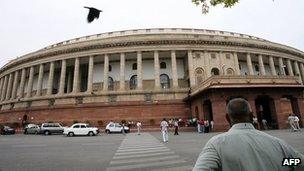Deja vu hits India's parliament
- Published
- comments

The legislative output of India's parliament has declined
There is a feeling of deja vu over the present impasse in the parliament.
Last year, external, the parliament sat for 73 days for over 800 hours. Around 30% of the time was lost due to disruptions, according to the watchdog PRS Legislative Research. A total of 54 bills were listed for consideration and passing into law. Only 28 were actually passed. Some 97 bills were pending when the parliament shut.
Things began on a rosier note, external this year.
Nearly 90% of the time available during the budget session - March to May with a three-week recess in April - was productive, "significantly higher than the productive time registered in the last few sessions", according to PRS. Twelve bills were passed, and 17 new bills were introduced. Over 100 bills were pending at the end of the session.
And suddenly, it's yesterday once more.
The ongoing monsoon session, external - with 20 sittings between August and September - has been deadlocked since Tuesday with the main opposition Bharatiya Janata Party (BJP) demanding the resignation of Prime Minister Manmohan Singh over a report that India lost $33bn (£20bn) by selling coalfields cheaply.
Mr Singh has offered to make a statement on the government's position, but the BJP, "choosing agitation over debate" as one newspaper describes it, says nothing short of Mr Singh's resignation will satisfy them.
Look at what India is losing out on.
During the ongoing monsoon session, there are some 29 pending bills for consideration and passing into laws.
These include laws to prevent money laundering, checking corruption, protecting women from sexual harassment at workplace, protecting whistle blowers, amending laws relating to banking and marriage, and regulating higher education, among other things.
But the possibility of these bills being debated or passed looks bleak with every passing day.
Stuck between what many say is an evasive and indecisive government and a belligerently intransigent opposition, bipartisanship appears to have suffered an irretrievable breakdown. This does not bode well for the future of India's democracy.
India's parliament has had a chequered history.
The first 13 parliaments passed more than 3,200 bills, but the legislative output slowed down in the 1990s as India's politics fragmented and political instability grew.
As Devesh Kapur and Pratap Bhanu Mehta argued in a paper, external, political instability and a divided parliament - with the ruling coalition often a minority in the upper house - contributed to the slowing down of output.
They also believe that the parliament takes itself less seriously today, "starkly evident" in the declining number of days it is in session - the number of sittings has declined by about a third since 1950s.
Putting the government on the mat through robust debate is the job of a feisty, vibrant opposition party; but paralysing the house with grandstanding and an obdurate go for broke attitude makes it look petulant and irresponsible. When will India's political parties stop making a scene and begin debating more in the parliament?